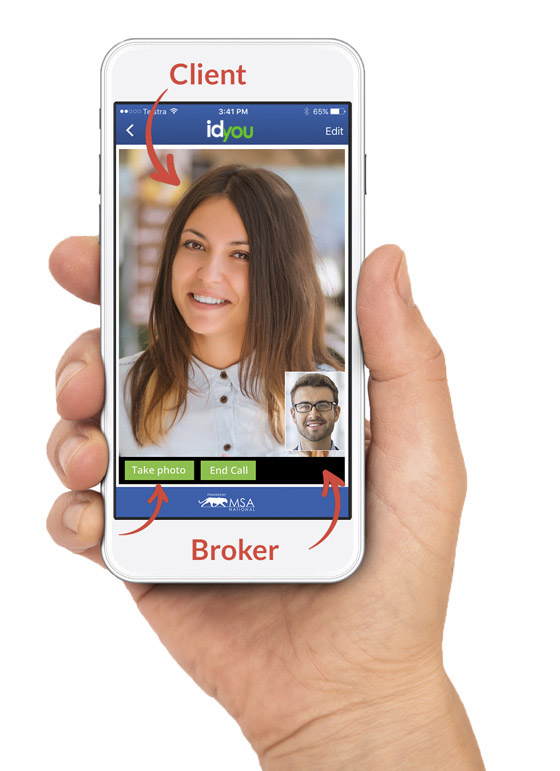 Remote
Verification
Remote
Verification
IDyou allows you to perform VOI remotely from any location. When it’s not possible to meet in-person with
your client, IDyou’s remote option allows you to verify your client face-to-face via video.
* Available on Apple IOS & Android
How it works
- Use the ‘Remote’ IDyou option in the app to send your client a link to download a version of IDyou.
- Your client will download the client version of IDyou, enter their information, take photos of their identity documents and sign a declaration.
- You will receive a notification that your client has completed the process and then review their information.
- You initiate a video call to see your client face-to-face and take an additional photo of them to confirm likeness to their identity documents.
- You sign the verifier declaration and finalise the VOI to generate the secure VOI report.
Key benefits of IDyou
- High Quality call and video resolution.
- Easy to use for both you and your client.
Compliance with the VOI Standard
New rules require brokers/loan writers to take reasonable steps to verify the identity of their clients. Rule 6.5.2 of the Model Participation Rules states that in order to comply with the requirement to take reasonable steps, you can either:
(a) apply the Verification of Identity Standard; or
(b) verify the identity of a Person in some other way that constitutes the taking of reasonable steps
ARNECC Model Participation Rules – 5.5
Conveyancing rules require brokers to take reasonable steps to verify the identity of their clients. What constitutes reasonable steps is dependent on the circumstances of each individual case. Further enquiries should be made where doubt arises, or should reasonably have arisen, in relation to a transaction and a person’s identity. In cases where verification is unable to be conducted face-to-face due to remoteness, IDyou’s ‘remote’ option allows you to complete the verification by electronic means and conduct further steps to satisfy yourself of the person’s identity. Conducting verification electronically is mentioned in the ARNECC Model Participation Rules Guidance Note 2 [page 5, 5.5 Further Steps].
How to Use Remote Verification
Does Remote VOI pass the Reasonable Steps test?
VOI rules require that mortgage brokers take reasonable steps to verify the identity of their clients. What constitutes reasonable steps is dependent on the circumstances of each individual case. However, in Schedule 8 of its Model Participation Rules, ARNECC sets out a Verification of Identity Standard, which if followed is deemed to constitute reasonable steps (Rule 6.5.6). The VOI Standard requires:
- VOI to be conducted during a face-to-face in-person interview;
- that the verifier be satisfied that the person being identified is a reasonable likeness to the person depicted in photos on the identity documents; and
- that the identity documents provided meet one of the set out categories.
It is a common misconception that if you stray from the VOI Standard you are not taking ‘reasonable steps’.
Of course, it is advised to follow the VOI standard whenever possible as it can provide safe harbor, however it is important to note that the VOI standard is not mandatory in situations where it is not possible to follow. There are circumstances in which a face-to-face in-person interview is not possible due to remoteness, and in those cases brokers can conduct VOI by taking other reasonable steps.
“ARNECC explicitly acknowledges this type of remote situation.“
It provides a list of examples of further steps that can be taken, citing one example as “where the verification is unable to be conducted face-to-face due to remoteness conducting the verification by ELECTRONIC MEANS with further steps to satisfy yourself of the person’s identity.” ARNECC Model Participation Rules Guidance Note 2 [page 5, 5.5 Further Steps].
The Best Electronic Option?
Mobile Apps like IDyou have a REMOTE option that allows brokers to complete the verification by electronic means on their iPhone or iPad. Using IDyou, the client can securely send the broker photos of the identity documents so the broker can assess whether they appear genuine. Once the broker has received sufficient identity documents, they then arrange a video call with the client during which they take a photo of them and can compare it to the documents to confirm likeness. Finally, the broker and client sign client and verifier declarations and IDyou creates a VOI report that is securely stored in the cloud server for 9 years.
Other options?
Option 1: Brokers can send customers to their local Post Office. Think long queues, delays & high cost.
Option 2: Some companies are offering couriers to conduct the VOI on the broker‘s behalf. But will customers feel comfortable handing over their ID to a complete stranger?
Bottom Line!
The bottom line is that using a mobile App like IDyou to conduct VOI remotely is still the best and most secure option after a face-to-face VOI. Some lenders are getting very cute about scrutinising any solution that is digital but the reality is that the current manual state of conducting VOI is frought with security and privacy dangers. Brokers commonly complain about having hard copies of clients ID floating around their suit case and office. Some don’t have the storage space or the security destructions facilities. Worse still, some brokers who are photographing and using generic Apps to convert ID documents to PDF are walking around with people’s ID documents on their camera roll! Mobile Apps like IDyou don’t store any information on the mobile phone or the App itself.
It is important to remember that even when the VOI Standard is followed, brokers must undertake further enquiries where doubt arises, or should reasonably have arisen (Rule 6.5.3). As a guide, The Participation Rules require further steps to be taken where:
- an identity document does not appear to be genuine;
- a photograph on an identity document is not a reasonable likeness;
- the person being identified does not appear to be the person to which the identity documents relate; or
- it is otherwise reasonable to take further steps.
If you have any questions contact us

























